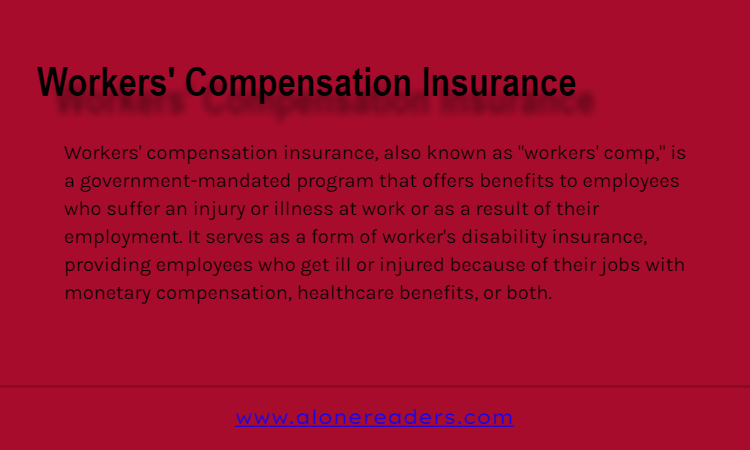
Workers' compensation insurance is a type of employer insurance that provides benefits to employees who get injured on the job or become disabled as a result.
Employees lose their right to sue their employers for damages when they take workers' compensation insurance benefits.
Workers' compensation insurance, also known as "workers' comp," is a government-mandated program that offers benefits to employees who suffer an injury or illness at work or as a result of their employment. It serves as a form of worker's disability insurance, providing employees who get ill or injured because of their jobs with monetary compensation, healthcare benefits, or both.
Workers' compensation is generally managed by the different states in the United States. The perks that are required vary significantly between states.
Only Texas prevents businesses from the requirement to maintain workers' compensation insurance.
Should an illness or accident occur while an employee is working, workers' compensation insurance serves to protect both employers and employees. Employers must abide by the laws of each state to guarantee that injured workers will receive the required coverage.
Workers' compensation insurance claims can only be made by employees whose illness or injury is related to their work-related responsibilities. Examples of common injuries include strains brought on by hard lifting, slips and falls, and accidents while operating machinery.
There are two types of workers’ compensation insurance: Coverage A and Coverage B.
Workers' compensation benefits can assist with covering the following expenses if your employee contracts a sickness or accident at work:
Medical Costs
The coverage provided by workers' compensation insurance helps your employee pay for medical expenses related to an illness or injury that occurred at work. This may include visits to the ER, required procedures, and medicines.
Lost wages
When employee needs time off to recover from a work-related sickness or injury, workers' compensation can assist restore part of their missed wages.
Ongoing Care
There are some workplace-related diseases or injuries that can be so serious that they require many treatments. For instance, if a warehouse worker injures their back while carrying bulky boxes, workers' compensation insurance may be able to help pay for their ongoing medical expenses, such as physical treatment.
Funeral expenses
Workers' compensation insurance can assist with burial expenses and provide death benefits to your employee's beneficiaries if they pass away due to a work-related injury.
Illness
Workers' compensation insurance can assist in defraying your employee's medical expenses if they become ill as a result of an incident or condition that occurred at work.
Repetitive Injury
After years of bad ergonomic typing technique, if your receptionist gets carpal tunnel syndrome, workers' compensation may be able to help pay for treatment charges and ongoing care expenses.
Disability
Your disabled employees may be eligible for benefits under your workers' compensation policy to assist with paying their medical expenses and partially making up for lost wages.
The regulations differ by geography and occupation, but almost every state mandates that businesses carry workers' compensation insurance to protect employees. It is essential to get in touch with your state's government agency to find out if you are covered because some states won't cover seasonal workers, independent contractors, or agricultural workers.
Typically, workers' compensation doesn't cover:
The required benefits and cost of workers' compensation insurance differ from state to state. There are also various fees depending on whether the employees insured work in high-risk or low-risk roles.
The insurance premiums are calculated based on the company's payroll figures. Just a few examples
Salary Replacement: In most cases, a worker's compensation claimant receives a salary replacement payment that is less than their full salary.
Healthcare Cost Reimbursement and Survivor Benefits: The majority of compensation plans only cover medical costs for injuries sustained as a direct result of employment when they pertain to work-related accidents.
Recipients Waive Their Legal Rights: The right to sue an employer for carelessness is waived by employees who accept workers' compensation benefits.
Unique Considerations: Insurance fraud can also occur with regard to payments for workers' compensation. An employee may manufacture an injury, misrepresent the severity of an ailment, or falsely claim that it was sustained on the job.
The vital members of your team, the employees, are protected by workers' compensation insurance. You rely on them to provide the support, information, and skill required to advance your company to the next level. They depend on you to look after them if something unexpected occurs.
Every state (except Texas) in the US mandates that companies offer workers' compensation insurance to at least some of their workforce.